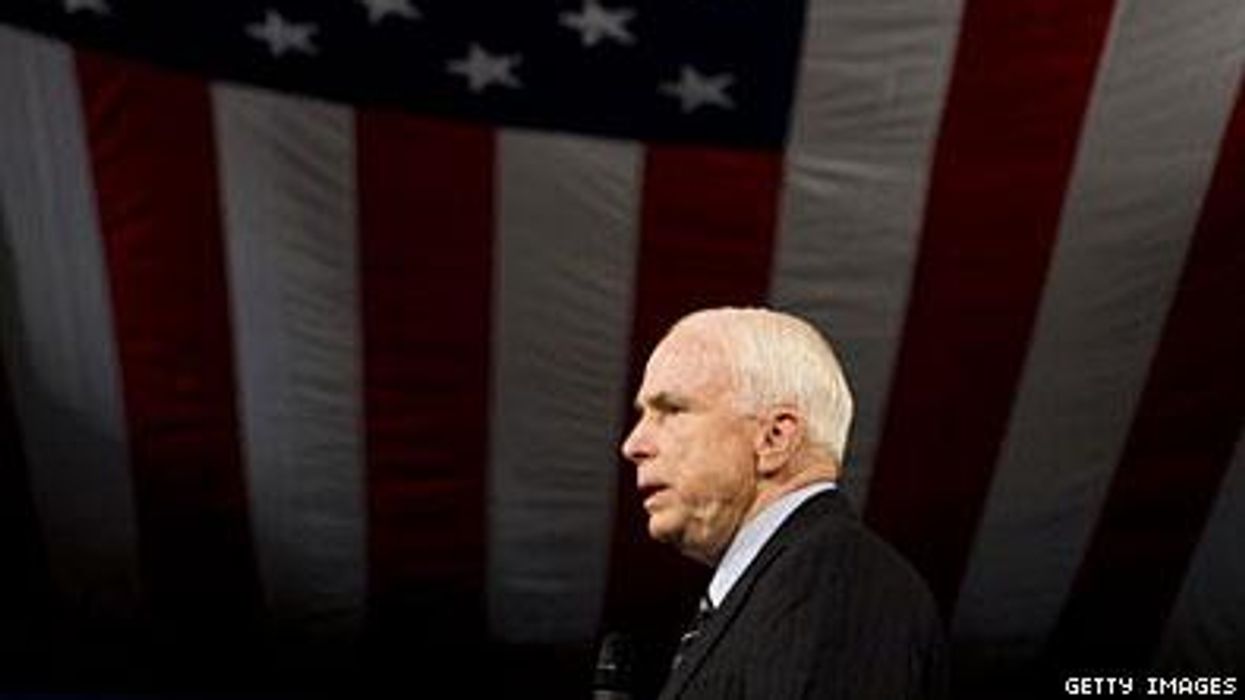
Gay Republicans are hoping the Arizona senator can be won over to our side. Don't count on it.
August 04 2008 12:00 AM EST
By continuing to use our site, you agree to our Privacy Policy and Terms of Use.

Gay Republicans are hoping the Arizona senator can be won over to our side. Don't count on it.
With every new presidential election, the gap between Democrats and Republicans on gay issues grows steadily wider. Consider some glaring differences:
During a June 26 Democratic fund-raiser hosted by the Gay and Lesbian Leadership Council in New York, Michelle Obama declared, "We are only here because of those who marched and bled and died -- from Selma to Stonewall." And in a letter read to the San Francisco-based Alice B. Toklas LGBT Democratic Club this June, her husband both pledged to "support extending fully equal rights and benefits to same-sex couples under both state and federal law" and sent his congratulations to "all of you who have shown your love for each other by getting married these last few weeks." Barack Obama is also undoubtedly the first presidential candidate to repeatedly attack homophobia in the black community, while speaking before black audiences.
When he was still something of a maverick, John McCain did oppose the 2006 amendment to the U.S. Constitution that would have banned gay marriage. But now (unlike Obama) McCain supports the California ballot initiative that would reverse the decision of that state's highest court to legalize gay marriage (just as he supported the unsuccessful attempt in 2006 to ban marriage equality and roll back domestic-partner benefits in his home state of Arizona). McCain also opposes the federal Employment Non-Discrimination Act passed by the Democrat-controlled House of Representatives last fall -- and he continues to say he doesn't know any military commander who thinks "don't ask, don't tell" is a bad idea. According to the Human Rights Campaign, as McCain geared up for this recent presidential bid, his pro-gay voting record plummeted from 33% in the last Congress to just 17% in the present one.
So why would any gay person want to vote for McCain?
At press time, the Log Cabin Republicans still hadn't formally endorsed the presumptive GOP nominee, but their website and their publicists (including New Republic editor Jamie Kirchick, who assembled all of their arguments in a piece for Advocate.com last March) make it clear that their support for McCain is a foregone conclusion.
Though George W. Bush and McCain both take the wrong positions on almost every important gay issue, Log Cabin president Patrick Sammon argues that the key difference is that McCain won't use them as wedge issues to "turn out the Republican base." But if he's not using us as a wedge, why did McCain publicly oppose gay adoptions in The New York Times and throw his support behind the California initiative to ban gay marriage? Why did McCain's campaign make robo-calls during the primary to attack former Massachusetts governor Mitt Romney's past support of "special rights" for gays? (When McCain was criticized for those calls, he ended them.)
Sammon says he sees a difference between simply having the wrong position and "sending out direct mail and highlighting it."
Does that mean the best you can hope for from a national Republican presidential candidate is someone who stridently opposes most gay rights but doesn't actively energize the antigay vote in the general election?
Sammon sidesteps that query. "The question we need to answer is, Do we think [McCain] can be moved on any issues if he's elected president?" he says. "I don't think it's necessarily a wise strategy for our movement to put all of its chips on one side of the table; when there are some promising parts of his records and there's the potential to move him."
Doesn't that mean support for McCain requires an act of faith on the part of a gay voter -- and possibly a certain amount of self-hatred? "Absolutely not," Sammon says. "Equality won't be achieved until we move Republicans. It would be easy for me to get mad that more of them aren't where they need to be. It's frustrating and it takes time, but I think we're making progress. For me to just give up might feel good for 12 hours, but it doesn't actually improve things. You're still going to need Republican support to get anything done."
Maybe so, but a Democratic president with enhanced majorities in Congress would produce much more progress on gay issues, much more quickly.
Charlie Kirk DID say stoning gay people was the 'perfect law' — and these other heinous quotes